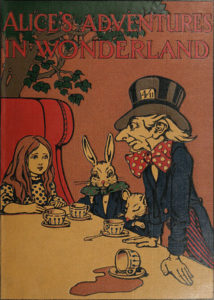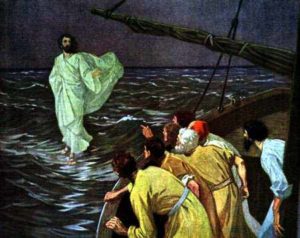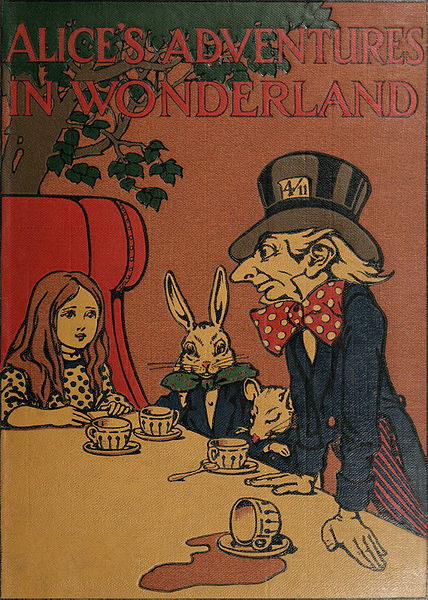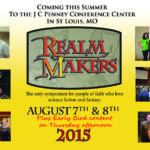Once Upon A Time In Wonderland – A Review
 I confess–I’ve never been a fan of The Adventures of Alice in Wonderland by Lewis Carroll. In fact, I can’t recall ever reading more than a small Golden Book version of the story, and that I didn’t like. There was too much confusion and what felt like aimlessness. Yes, it was inventive, but to what purpose? It didn’t feel as if there was one.
I confess–I’ve never been a fan of The Adventures of Alice in Wonderland by Lewis Carroll. In fact, I can’t recall ever reading more than a small Golden Book version of the story, and that I didn’t like. There was too much confusion and what felt like aimlessness. Yes, it was inventive, but to what purpose? It didn’t feel as if there was one.
Consequently, I was less than enthusiastic when I learned about ABC’s latest fantasy TV show Once Upon A Time In Wonderland. Add in the fact that I’ve been disappointed with a number of the other recent network fantasy offerings–The Legend of Sleepy Hollow, Grimm, and to a lesser degree Once Upon A Time–because they inevitably devolve into some iteration of horror. I’m not a fan of horror and less so of horror in the hands of those who demonstrate a lack of reverence for or disbelief in God.
When ABC advertised the new show with the tag line “Not the Alice you thought you knew,” I almost passed on it. How much more proof did I need, to know that the show’s creators were taking a direction leading away from the story Lewis Carroll originally wrote?
But . . . then, . . . I didn’t much care for that original story, did I, so what could a show tampering with it do to hurt it for me? I watched the premier last week and how glad I am that I did.
 The show opens with a young Alice climbing out of the rabbit hole down which she’d fallen, and running home to tell her family she’s all right. Her father is more shocked than glad to see her because she’d been gone so long, they’d given her up for dead.
The show opens with a young Alice climbing out of the rabbit hole down which she’d fallen, and running home to tell her family she’s all right. Her father is more shocked than glad to see her because she’d been gone so long, they’d given her up for dead.
Alice tells about her adventures in Wonderland, but no one believes her. The more she insists she’s telling the truth about all the strange happenings, the more her family worries. For the first time her father suggests she might be going insane.
She determines to return to Wonderland to find proof she can bring back to show everyone she is not lying, imagining, or out of her mind. Over the years, during her many journeys into the fantastical world, she falls in love with a handsome genie. When the Queen of Hearts appears to kill him, Alice returns home broken. Her father, more convinced then ever that she is insane, has her institutionalized.
The story jump cuts from young Alice to a grown-young-woman Alice in the Victorian-era mental hospital telling a board of doctors that yes, in fact, she now knows Wonderland isn’t real, that she did make it all up. Their response to her retraction after all these years is less than favorable–they don’t believe her disbelief now any more than they have ever believed her veracity.
To avoid spoilers, I won’t tell you what happens next, but suffice it to say, Alice manages to return to Wonderland, this time in search for Cyrus, her genie she fell in love with. She’s given to believe he may still be alive and that idea coincides with what she feels in her heart. Wherever she searches, however, she comes away with no evidence that he survived, and those closest to her tell her she is making up what she wants to believe rather than accepting what actually is.
Sound familiar?
At home Alice was excoriated for believing in Wonderland; in Wonderland she is criticized for believing Cyrus is still alive. Despite the doubts, opposition, and betrayals, Alice holds fast to what she knows to be true, though admittedly her belief that Cyrus lives appears to stand on the shaky ground of her emotions. Still, she’s admirably confident and firm in her convictions. She wavered in the asylum only because she thought she had lost her purpose–Cyrus.
There’s much to like in this show, judging from the first episode. The acting was superb, the fantastical setting remarkably inventive and other–perfectly suited to the feel of the Lewis Carroll story. Behind the techno cleverness is a sound story–a heroine who is strong in her own right and determined to achieve her goal. It’s easy to jump on board and cheer for Alice to succeed.
Deeper still is the issue of belief and Alice’s willingness to cling to what she knows though people in both her worlds doubt her word and actually work to dismantle her . . . shall we call it, faith?
I have no reason to believe the creators of Once Upon A Time In Wonderland were aiming to make any religious statements. More likely, they are espousing the popular, “the strength is within you if you only look hard enough to find it” worldview. Alice, after all, doesn’t rely on magic or a knight in shining armor to save her. In fact she’s tied to a Knave, wanted for his unscrupulous past deeds and inclined to steal the only thing of value Alice has–if it were possible. And yet she manages to deal with a number of obstacles using her own guile and physical prowess.
 Despite the difference in worldview, I see her predicament as remarkably similar to what Christians face. We live in two different worlds–that of “Wonderland” where miracles happen, and that of this world where our beliefs mark us as silly or insane. Sadder still, in the community of faith, where people say they believe in the mystical, the spiritual, the religious, when Christians who believe in the authoritative Word of God proclaim our love relationship with the Author and Creator of all, we receive dark looks for our “know it all” attitude.
Despite the difference in worldview, I see her predicament as remarkably similar to what Christians face. We live in two different worlds–that of “Wonderland” where miracles happen, and that of this world where our beliefs mark us as silly or insane. Sadder still, in the community of faith, where people say they believe in the mystical, the spiritual, the religious, when Christians who believe in the authoritative Word of God proclaim our love relationship with the Author and Creator of all, we receive dark looks for our “know it all” attitude.
In short, as unintentionally as I believe it to be, I think the writers of this first episode of Once Upon A Time In Wonderland uncovered the Christian’s plight. Consequently the story resonated with me. I connected with Alice–her excitement to share her adventures, turning to dismay at the disbelief of her family, mirrors the experience of many in the Church.
As a piece of speculative fiction, I think Once Upon A Time In Wonderland succeeds. The “what happened after she got back” approach was a great way to connect with the original story but to clue viewers that the tale they were about to watch was new and different. I believe the show fulfilled that promise. I highly recommend Once Upon A Time In Wonderland, at least the premier episode.











































Tangenting off, I wonder if the show plays with narrative unreliability. The usual setup is that the audience knows Alice is right because we’ve seen it with her, but what if we didn’t? Or turn the screw further and have Alice begin to doubt in Wonderland, in reality, or especially in magic-boyfriend-whatshisface. Existential angst on a platter. There’s already plenty of room to play with the desire for acceptance and the pain of rejection and loneliness.
In any case, I think the more interesting story lies in Magic Boyfriend’s death. (Without a new love interest on the horizon. Don’t even go there, ABC.)
Oh, that’s got some potential as well, notleia, though harder to pull off onscreen than in print.
While I’m glad to see this review, I must admit I’m down about the main show because the last episode ended with confirmation that one of the characters has a lesbian crush on another. Seriously….
I agree completely Rebecca.